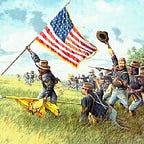Black Jack Self Study #52: Trust and Integrity
Originally Published 17 January 2019
Regardless of your personal thoughts of the National Football League, the Philadelphia Eagles, or Nick Foles as a player, you have to admit that what he was able to do over the past two seasons has been pretty remarkable. Part of his success is talent. A significant portion is his leadership and emotional intelligence in leadership. The short article linked here hints but one reason why.
Much has been said about the parallels of war and football — The Blitz, the long bomb, a “game of inches,” “fighting in the trenches” — all imagery and words describing both an athletic endeavor and that most unforgiving human contest of combat. The parallels of leadership are even more appropriate as leaders in both activities are ultimately attempting to motivate others towards success.
Clearly some businesses and professions are different than others, and ours is no exception. Trust is often a misconstrued term as trust is often seen as hands off — “I trust you’ll do the right thing” — which then abdicates me the responsibility to back check and to ensure things have been done properly. When one uses the term “trust” the automatic response should immediately be “in what?” Trust can be widely arching and lack specificity in the expected outcome. Blind trust in the execution of a task or mission with adverse results or results the “truster” didn’t ultimately expect can actually erode the intent behind the term.
Far stronger is belief and trust in the integrity of the individual.
Just as I explained in the Leadership Operations Overlay, Trust is the release point towards the objective of mission command, to use the language of Army leadership doctrine. I must trust you will operate within intent and in accordance with morals, values, and ethics and impeccable tactical and technical proficiency. More importantly, I trust that you operate within the constraints and limitations set before you to execute with integrity to accomplish the mission or to seeks help when necessary.
Integrity, stronger than trust, is a belief in the self-policing aspect in one’s work. To do things with integrity means the honesty and courage to admit failure or request help when necessary. Trust in the integrity of the individual to do the right thing, even when no one is there to monitor.
Sounds a lot like an Army Value…
Thank you for all you do every day to keep us Ready.
Question for Discussion:
- What, in your mind, is the difference between trust and integrity and why are both important to our profession?
